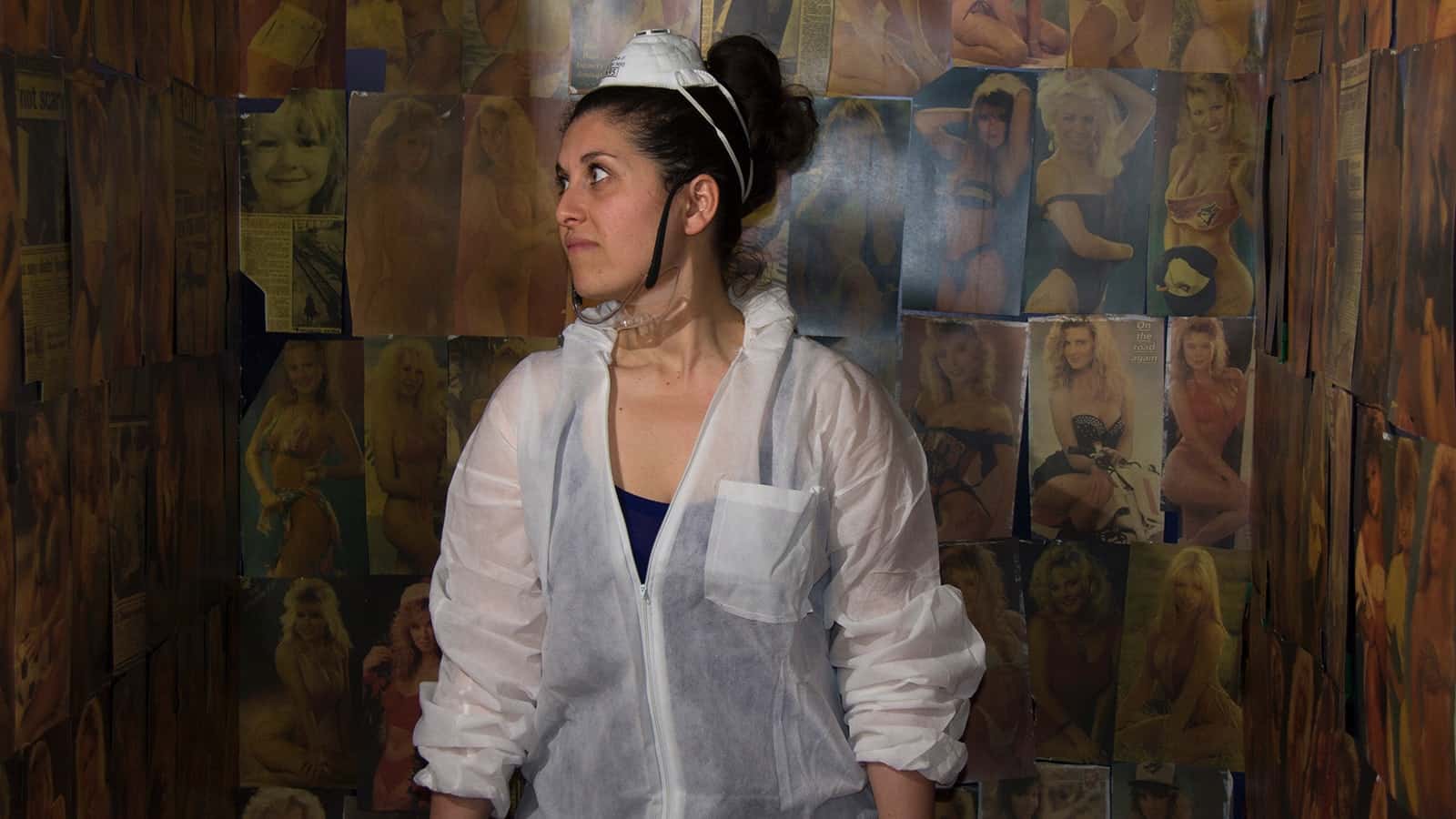When Jennifer McKinley returned to her childhood home, going into the basement felt like entering the lair of a serial killer. Plastered on the wall were hundreds of yellowed, water-damaged Sunshine Girls, painstakingly clipped from the newspaper. Originally put there by a boarder named Bill, they remained as a living shrine to an era.
She initially wanted to turn the room into an art installation, recreating it so other people could experience this creepy feeling. She ended up turning it into a solo performance, Operation SUNshine. In it, she plays four of the Sunshine Girls, the older and younger version of herself, her father, and other characters.
We asked her about the play this week.
SDTC: What stood out to you the most about these women?
JM: Normally, they have those descriptions – “Jemina likes sports and horseback riding” – but the boarder cut those off. Then he signed names on the fleshier parts of their bodies – on their hip or butt cheek – in his very distinctive cursive writing. Sometimes he didn’t like their names, so he’d re-name them. Gone – all description, context. Gone. Part of why I wanted to tell this story was to fill those gaps in.
The flip side was what was going on in the world at that time, right?
Yes. On one side was the Sunshine Girl, and on the reverse would be details of missing, murdered and abandoned children. Another one was the crisis in Romania at the end of the Cold War. Ceaușescu banned birth control so all of these women were having babies that they couldn’t afford and didn’t want and were dumping them in orphanages.
Another was a young girl from Etobicoke who was murdered by a family friend. He strangled her and sexually assaulted her, but he told the police he did it because she had a learning disability and he wanted to send her to heaven. Her mother was addicted to crack cocaine and was a sex worker to pay for her addiction. She was actually murdered by a serial killer in 1997. Another was a girl named Andrea Atkinson who was murdered at age six; the janitor did it.
You cover an era from 1988 to 1991. Have things changed in terms of media representations of women?
I’m baffled at how little has changed. On one of the newspapers, there was an article about a councillor who voted to end swimsuit competitions at City Hall – like the CHIN bikini competition at Nathan Philips Square – because they objectified women. The backlash to this was, “These prudes don’t want us to have our fun anymore.” I don’t think that would be published in a newspaper anymore, but I do think it would be in the comments.
The gender-based violence has not changed in twenty-five years. I don’t see any institutional changes in policing. I see some institutional changes in government. We are so far from where we as feminists would like to be, beyond equal pay.

How did your view of the room change over time?
When I was a kid, I loved it. I always liked watching Bill sign his names on the women. It wasn’t wise to go downstairs in Bill’s space. But the bathroom scale was in the basement so I’d say, “I’m going to weigh myself” and I’d creep down, make sure Bill wasn’t there, and I’d go in this room and just be in awe.
As I got to be a teenager, there was a lot of internalized misogyny. I’m looking at you in your bathing suits and judging you, loving it. I’m not you. I’m wearing jeans. I’m considered boyish enough. I’m not part of this world. Nobody is going to look at me like that. But they’ll look at you like that so I have some sort of superiority over you because of that.
Then coming back down years later, I was like, “Oh yeah – you! Wow.” There was a lot of water damage, there was a leak in the ceiling so there was sludge. Cigarette butts, nicotine-yellowed walls.
Why do you think that men feel the need to have these images of women surrounding them?
It’s titillating. You’re a lonely guy. Sunshine Girls are for lonely guys, however that’s defined.
Do you feel sorry at all for them – for these lonely guys?
Fuck no. I worked in a factory as an undergrad and the women’s union organization was adamant that they had to take the naked Playboy pictures of women off the wall. They fought and fought. So the naked Playboy women gave way to Maxim and FHM, and you’d see these men walking around with these magazines in their coverall back pocket. I never thought, “Poor you!” I don’t have sympathy for that. They gross me out. Those surveys gross me out. But I never said anything.
What do you want audiences to take away from Operation SUNshine?
Objectification of women leads to gender-based violence. I don’t lead people to that conclusion, but you’re looking at a woman in bathing suit on one page, then on the page behind her you’re reading about how this guy killed his wife. It’s not a direct link, but there it is. What you see on one side – here’s the dark side.
A social culture perpetuates this misogyny. I made it out unscathed. A lot of shit could have happened to me in this type of environment. But it didn’t happen to me because my father didn’t want it to happen to me. My father was reckless but also was very determined that I would leave this type of life. You need a person like that – you need a man like that in your life. To support who you are, and say, “No you can’t hurt this person. I won’t let you hurt this person.” It’s almost White Ribbon campaign stuff. Let’s teach men that toxic masculinity hurts everybody.
It asks if it’s really fine to say, “I’m okay with women who want to pose like this – except that I’m embarrassed by it. I would never do it. And I cringe whenever I look at it.” That’s a really complicated relationship to have. I want audiences to come away with an acknowledgment of that complication.
Check out Operation SUNshine at Fringe July 7-15. Get tickets here. To view the room in the basement, visit here.



 Follow Us On Instagram
Follow Us On Instagram
